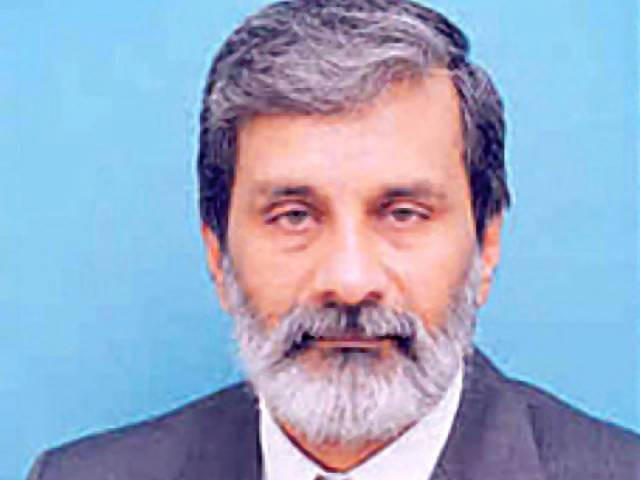‘Absence of objective criteria’ benefitting loyalists
Justice Baqar defends seniority principle in judicial elevations

Justice (retd) Maqbool Baqar on Saturday stated that elevating junior judges to the Supreme Court disenchants senior judges of the high courts, who may feel slighted, thus, affecting their performance.
The justice’s statements were made during his address to the Sindh High Court Bar Association.
Justice Baqar in his speech said, “Appointing junior judges not only fosters resentment within the bench but also disenchants senior judges. More importantly, however, the absence of objective criteria for judicial elevations may pave the way for loyalists to be rewarded at the altar of fairness and objectivity."
The comments come in light of the appointment of six junior judges to the post of the apex court in the last five years. There is a sharp division in the Judicial Commission of Pakistan (JCP) on the elevation of junior judges to the SC.
The former justice furthered that recalcitrance with respect to greater transparency and evolving an objective criterion with the commission’s proceedings, severely affects the credibility of the judiciary.
“Given that the judiciary controls neither the sword nor the purse, its strength lies merely in its credibility," he said.
Quoting Justice Holmes of the United States Supreme Court, Justice Baqar said “life of the law has not been logic, it has been experience.” He added that experience suggests that the judiciary has been more susceptible to external attacks when afflicted with internal fissures. It is, therefore, imperative that the bar and the bench both come together to build bridges where there are chasms.
The justice stated that objectivity and transparency were critical to the independence of the judiciary. Nonetheless, proceedings of the Judicial Commission of Pakistan and the practice of preferring junior judges at the expense of their more senior colleagues has created fissures between the bar and the bench and within the judiciary as well.
“While some friends often speak at length about the need to prefer merit over seniority, the said dichotomy, in my considerate view, is without any foundation. This dichotomy presumes that merit and seniority are mutually exclusive," he reiterated.
Justice Baqar claimed that tensions arising over judicial appointments have particularly affected the functioning of the Sindh High Court, where a notification appointing the Chief Justice of the High Court as an ad-hoc judge of the Supreme Court remains in field.
“Nonetheless, the chief justice continues to constitute benches, supervise the subordinate judiciary, nominate judges to the High Court, and perform all other functions concomitant with the office of the Chief Justice of the High Court. The functioning of the High Court has, therefore, been afflicted with a constitutional crisis and I would personally like to urge all stakeholders to come together and address this at the earliest", he added.
Justice Baqar criticized the practice of elevating junior judges, stating that it has “fractured the relationship between the bar and the bench” and “simmered” tensions within the bench itself.
“The restoration of the judiciary, we believed, was the beginning of our journey towards a more just and egalitarian society… but it appears that we may have lost our way,” he claimed.
Read SCBA throws weight behind Justice Baqar
The retired justice further said that another vital aspect which has affected the judiciary’s independence, impartiality, and integrity is the issue of case assignment. While it pertains to the internal dynamics of the judiciary, it has very serious repercussions, he added.
The United Nations Special Repertoire on the independence of judges has urged for a fair and objective criterion for the assignment of cases which would protect judges from undue interference.
"Exclusion of certain judges from the hearing of sensitive cases on account of his independent and impartial views has an adverse effect on the impartiality of judges while also tarnishing the public’s perception about the independence and integrity of the judiciary,” he criticized.
He added that the practice tends to affect the morale of judges who are consigned to irrelevant benches and fosters feelings of ill-will and hostility amongst members of the bench.
Referring to the legal process, Justice Baqar stated that lawyers must remain respectful and uphold the highest standards of ethics and moral uprightness. Similarly, judges must be temperate, respectful, and are duty bound to give parties a patient hearing.
Recounting his experiences, Justice Baqar said, “After I was elevated to the bench, some of our senior judges would remind us that a judge shuts his mind when he opens his mouth. Judges, therefore, ought to be careful in how they interact with lawyers and litigants and must conduct themselves with the grace that befits their office".
He also urged members of the legal fraternity to remain cognizant of the severe disparities and volatility that underpin our society.
“Judges cannot afford to be blind residents of elite institutions,” he stated, “they should rather be sensitive to the struggle of the common man and should be attuned to the humans that they are applying the law to.”
The former justice stated that the more “mechanized or high handed” the judiciary, the further it moves from the application of justice. He added that there must be an empathetic and people-oriented approach to adjudication, as it is critical to the judiciary’s independence.
“We must be empathetic, kind, and afford them a patient hearing. Hubris, aggression, and justice rushed are all recipes for justice crushed. It is about time we develop a people-oriented approach to adjudication,” he said.
With regard to the pace of adjudication, Justice Baqar said that pendency and delays severely impairs judgement as justice today is “neither inexpensive nor expeditious.”
He urged courts to employ modern technology to arrest unnecessary delays. Electronic filing and audio/video recordings that allow transcripts of proceedings to be produced for every hearing are options worth exploring. Such measures add more flexibility, save time, and eliminate the need for judges to take notes and instead, concentrate on the proceedings. He upheld that such measures are also likely to obviate the possibility of misdemeanor during proceedings as every utterance forms part of the record.
"Given the staggering pendency afflicting courts throughout the country, it is also imperative for us to devote more resources to alternate forms of dispute resolution,” he advised. The retire justice added that in the realm of commercial disputes, it may be worthwhile to focus on arbitration. This may entail amending the current arbitration framework to bring it in line with the international arbitration regime and United Nations Commission on International Trade Law’s (UNCITRAL) model arbitration law.
“This would not only ease the burden on our domestic courts but would also improve Pakistan’s reputation as a safe destination for foreign investments, thus, giving some much needed impetus to our precarious economy,” he said.
Backing the seniority principle
Top court’s senior puisne judge Justice Qazi Faez Isa had earlier, strongly advocated appointments to the Supreme Court on the basis of the seniority principle in the absence of objective criteria.
Justice Isa, who is a member of the Judicial Commission of Pakistan (JCP), wrote a letter to chairman of the body, Chief Justice of Pakistan Umar Ata Bandial, wherein he explained the advantages of the appointment of chief justices of high courts as SC judges.
He also gave the reasons as why to why junior high court judges should not be elevated to the SC. A copy of the letter was sent to all JCP members, interestingly including two former CJPs.
Justice Isa, in his letter, wrote that superior court judges were required to take an oath to preserve, protect and defend the Constitution. “An important component of this oath is to ensure that the peoples’ fundamental rights guaranteed by the Constitution are not trampled upon or trammeled. Therefore, an important factor to consider in the selection of superior court judges is also whether they have the requisite ability and determination to resist and repel unconstitutional acts, and the courage to preserve, protect and defend the Constitution,” it added.



















COMMENTS
Comments are moderated and generally will be posted if they are on-topic and not abusive.
For more information, please see our Comments FAQ